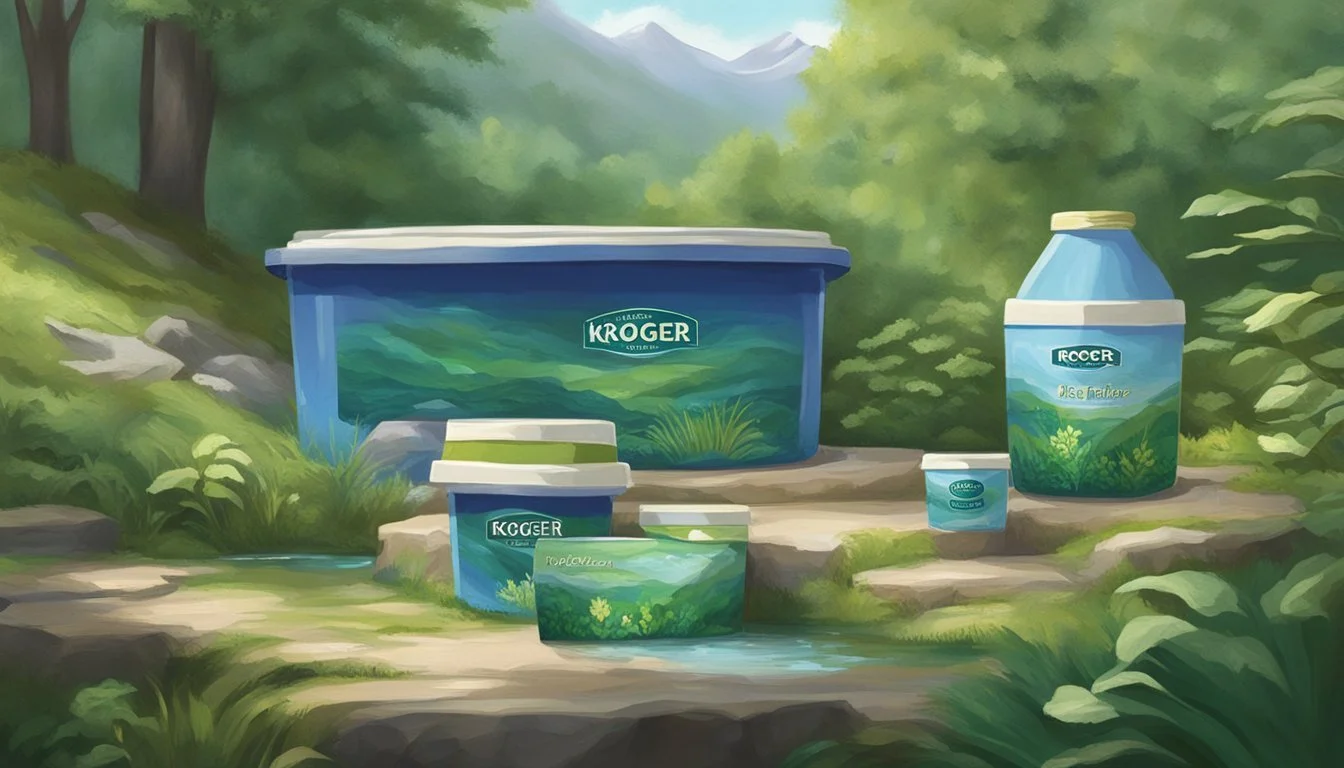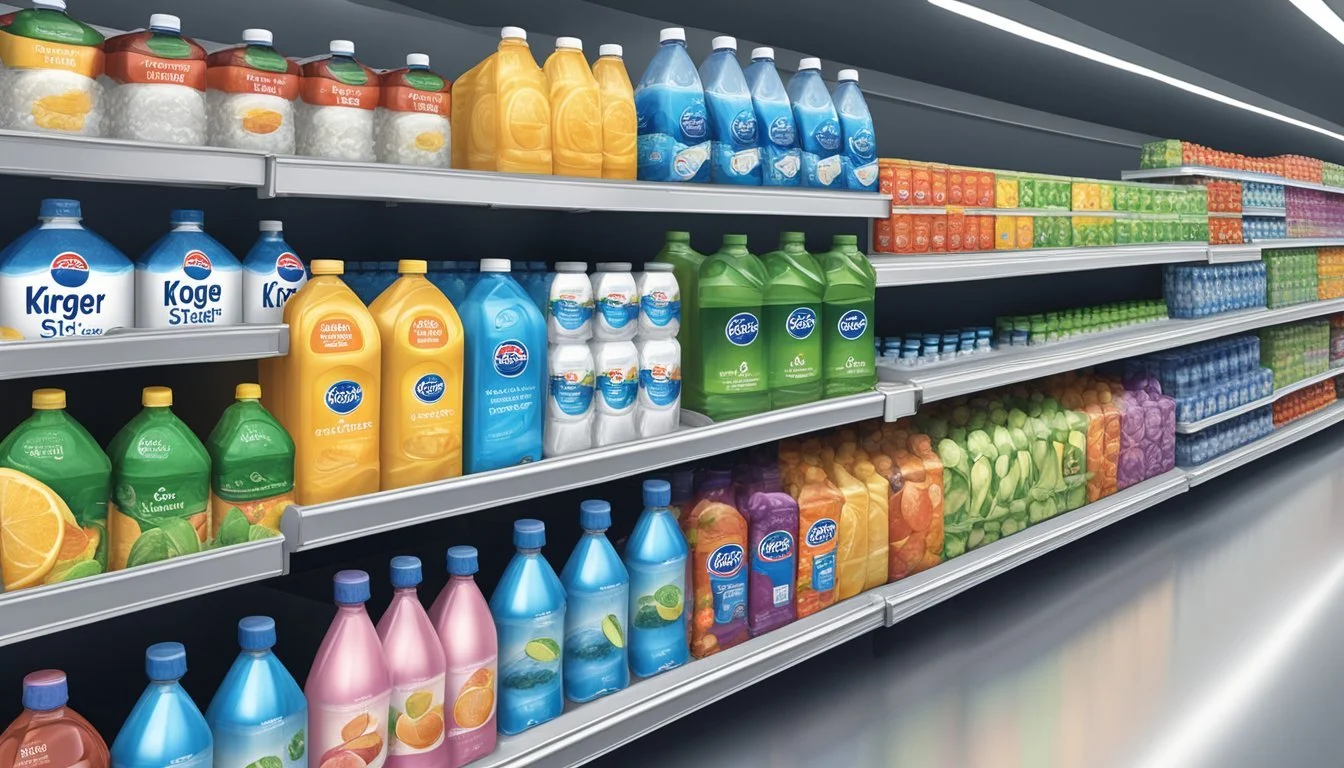Kroger vs. Open Water
A Comparison of Quality and Value
Choosing the right bottled water can be confusing with so many brands available. In this blog post, we'll compare Kroger and Open Water to help you make an informed decision. Both of these brands provide different benefits and experiences for the consumer.
Kroger bottled water is known for being an affordable option, meeting FDA safety and quality standards. However, it has been noted that sometimes it carries a slight plasticky taste. Despite this, it's a reliable choice for those on a budget who need clean, drinkable water.
Open Water, on the other hand, boosts its appeal by offering water in eco-friendly, BPA-free aluminum packaging. Open Water stands out for its commitment to reducing plastic waste while delivering a crisp and clean taste. This makes it a preferred option for environmentally-conscious consumers who are willing to spend a bit more for sustainable packaging.
Understanding Bottled Water
Bottled water comes from various natural sources and goes through distinct production processes before reaching consumers. The branding and presentation of bottled water also play crucial roles in consumer choice.
Sources of Bottled Water
Bottled water can originate from multiple sources such as spring water, artesian water, and municipal tap water.
Spring water is collected from natural springs where water flows naturally to the surface.
Artesian water comes from wells tapping into confined aquifers.
Some brands source their bottled water directly from municipal supplies. Nearly 64% of bottled water in America is essentially treated and purified tap water.
Types of Bottled Water
Different types of bottled water are available based on their source and treatment methods.
Spring water and mineral water retain their natural mineral content and undergo fewer filtration processes.
Purified water involves significant filtration and treatment, such as distillation or reverse osmosis, to remove impurities.
Flavored and carbonated waters provide variations for consumers looking for a unique drinking experience.
Production Processes
The production of bottled water includes filtration, purification, and bottling.
Purification processes can include methods like ozonation, reverse osmosis, and UV light treatment to ensure safety and quality.
After purification, the water is bottled in plastic, glass, or aluminum containers. Plastic bottles often raise concerns due to environmental impacts and potential contaminants like microplastics.
Branding and Brand Recognition
Branding plays a major role in the bottled water industry. Consumers often choose based on brand trust, perceived quality, and marketing.
Kroger, for example, emphasizes affordability and availability, often sourced from municipal supplies.
Open Water promotes sustainable practices with eco-friendly aluminum packaging.
Brand recognition can influence consumer preferences more than the actual quality of the water itself.
Comparing Quality and Taste
When choosing between Kroger and Open Water, quality assessments and taste profiles are crucial factors to consider. Consumers also seek reliable information from quality reports to establish trust in these brands.
Quality Assessments
Kroger bottled water meets FDA regulations, ensuring its safety and quality. It is typically filtered using methods like reverse osmosis or carbon filtration.
Open Water often markets itself as a more sustainable option, utilizing rigorous filtration processes to maintain water purity. They focus on eco-friendly packaging and emphasize their filtration standards.
Kroger emphasizes affordability and accessibility, while Open Water prioritizes environmental sustainability and high-quality filtration. Both brands ensure mineral content and electrolyte levels that aim to satisfy daily hydration needs.
Taste Profiles
Taste is subjective but critical in selecting bottled water. Kroger water is generally noted for its clean, neutral taste, free from any plastic aftertaste. However, some might detect minor variations depending on their palate.
Open Water, often described as very crisp and refreshing, appeals to those who favor an “untouched” taste. The brand avoids plastic altogether, using aluminum cans that may contribute to its distinctive freshness.
Both brands aim for a pleasant drinking experience, though preferences may vary. Some prefer Kroger's more traditional taste, while others lean towards the unique flavor profile of Open Water.
Quality Reports and Consumer Trust
Consumers rely on quality reports to judge a brand's reliability. Kroger consistently publishes detailed reports confirming their compliance with safety standards. Their transparency builds trust among regular buyers.
Open Water also shares its quality assessments openly, highlighting their commitment to sustainability and health. Their water sources and filtration methods are periodically reviewed, ensuring purity and safety.
While both brands provide satisfactory quality, each adopts a different approach to gain consumer trust. Kroger focuses on consistent quality, while Open Water highlights its eco-friendly processes.
Health and Safety Standards
When evaluating the health and safety standards of Kroger and Open Water, it is essential to understand the role of various regulatory bodies and the rigorous testing these products undergo to ensure consumer safety.
FDA Regulations
The Food and Drug Administration (FDA) sets strict guidelines for bottled water, including Kroger and Open Water. These regulations require adherence to specific standards for contaminants, such as lead, arsenic, and bacteria like E. coli.
Bottled water must meet the same Safe Drinking Water Act standards as public tap water. Regular testing ensures harmful substances do not exceed legal limits. Both brands work to meet these standards, ensuring their products are safe for consumer use.
Environmental Protection Agency Oversight
While the Environmental Protection Agency (EPA) primarily oversees public tap water, its guidelines influence how bottled water is regulated indirectly. The EPA sets legal limits for various contaminants, including heavy metals and microplastics.
Bottled water companies like Kroger and Open Water often align with these standards to maintain product safety. This adherence helps ensure that consumers receive water free from hazardous levels of contaminants and promotes public health.
Testing for Contaminants
Both Kroger and Open Water engage in rigorous testing for a range of contaminants. These include microplastics, lead, and other heavy metals. Testing is performed regularly to ensure harmful substances do not exceed permissible levels.
Consumer reports have indicated that certain brands have been found to contain contaminants, but both companies strive to minimize these risks through continual monitoring and improvements. Ensuring water quality remains a top priority for both brands, striving to provide safe hydration options.
Environmental Considerations
When comparing Kroger and Open Water, various environmental factors are essential to consider, such as packaging materials, carbon footprint, and respective sustainability initiatives.
Plastic vs. Glass Packaging
Kroger predominantly uses plastic bottles for their water, which contributes significantly to environmental pollution. Plastic bottles often end up in landfills and oceans, where they can take hundreds of years to decompose and can release harmful microplastics.
Open Water, in contrast, uses aluminum bottles, which are more easily recyclable than plastic and have a higher recycling rate. Aluminum can be recycled indefinitely without losing its quality, which reduces waste and conserves resources. Although aluminum production is energy-intensive, the recycling process uses significantly less energy compared to producing new aluminum.
Carbon Footprint of Bottled Water
The carbon footprint of bottled water encompasses the entire lifecycle, from manufacturing to transportation and disposal. Kroger's plastic bottles generally have a higher carbon footprint due to the energy required for production and the lower recycling rates compared to aluminum.
Open Water's use of aluminum bottles helps to mitigate some of this impact. Aluminum is lighter than glass, reducing transport emissions, and the higher recycling rate further diminishes the carbon footprint. However, the initial production of aluminum is energy-intensive, although the recycling process is much more efficient.
Sustainability Initiatives
Kroger has made strides in reducing its environmental impact through various initiatives. They are part of the International Bottled Water Association (IBWA), which sets standards for reducing plastic use and improving recycling rates. Kroger also offers recycling programs to encourage consumers to return used bottles.
Open Water actively markets itself as an eco-friendly brand, emphasizing sustainability in its operations. They participate in projects aimed at ocean clean-up, reducing plastic waste, and have a commitment to using recyclable aluminum packaging. Additionally, Open Water promotes the idea of reusability with its durable containers, encouraging consumers to refill them multiple times.
Both companies are addressing environmental concerns, but Open Water's use of aluminum and active participation in various ecological initiatives give it a competitive edge in terms of sustainability.
Economic Impact of Bottled Water
The bottled water market has significant economic implications, driven by costs, consumption patterns, and market trends. Analyzing these aspects reveals key insights into the financial aspects of bottled water.
Cost Analysis
Bottled water pricing varies significantly depending on the brand and type. High-end brands like Open Water often command higher prices due to eco-friendly packaging and premium sourcing. In contrast, more mainstream brands like Kroger offer more inexpensive options, making them accessible to a broader consumer base.
Cost breakdown often includes sourcing, purification, bottling, and distribution. The affordability of mainstream brands has contributed to the growing per-capita consumption of bottled water. However, the higher costs of premium options suggest a target market concerned with environmental or health aspects.
Market Trends and Consumer Preferences
Current market trends show a shift towards eco-friendly and health-conscious products. Open Water, with its emphasis on sustainable packaging, appeals to environmentalists. Kroger’s brand, on the other hand, continues to thrive due to its affordability and widespread availability.
Consumer preferences lean towards PET containers, which dominate the market despite ongoing concerns about plastics' environmental impact. Sales trends indicate growing consumption, supported by a 10% annual growth rate until 2026. Economic disparities influence purchasing decisions, with higher costs often limiting access to premium brands.
This duality of affordability versus sustainability shapes the market, offering insights into consumer behaviors and economic viability in the bottled water industry.
Case Studies: Kroger vs. Open Water
Both Kroger and Open Water offer distinct bottled water products that cater to different consumer needs. This section explores Kroger’s various water offerings, Open Water’s market position, and a comparative analysis of the two brands.
Kroger’s Water Offerings
Kroger provides several bottled water products, including its store brand and Simple Truth organic line.
Their bottled water adheres to FDA regulations, ensuring safety and quality.
There are concerns regarding contaminants like microplastics and BPA, though many bottles are now BPA-free. Kroger aims for affordability, with their spring water priced around $1.29 per gallon.
The environmental impact of using plastic bottles remains a significant concern, often adding to pollution and waste.
Open Water’s Market Position
Open Water markets itself as an environmentally friendly alternative to traditional bottled water. They package their water in reusable aluminum bottles, which are more sustainable than plastic.
Open Water emphasizes their commitment to reducing plastic waste and providing a premium product.
Extra points are often awarded to them for their crisp taste and eco-friendly packaging. Their products are generally priced higher but are targeted toward environmentally-conscious consumers.
Comparative Analysis
When comparing Kroger and Open Water, several key differences emerge.
Kroger focuses on affordability and availability, with plastic bottles that are convenient but pose environmental challenges.
Open Water prioritizes sustainability with reusable bottles, targeting eco-friendly consumers.
While Kroger meets basic safety standards, Open Water goes further by addressing the growing demand for sustainable products.
Consumer preferences may hinge on factors like price, taste, and environmental impact, with each brand catering to different priorities.
Consumer Information
Consumers need to understand bottled water labels and make informed choices based on safety and sustainability. Key factors include the water source, contaminants, types of plastics used, and environmental impact.
Understanding Labels and Quality Reports
Labels on bottled water provide crucial details about the water source and treatment processes. For instance, Kroger bottled water and other brands like Smartwater may indicate whether the water comes from municipal supplies or natural springs.
Consumers should look for water quality reports, which can often be found as a downloadable PDF on the brand’s website. These reports detail the levels of contaminants and compliance with regulations.
Reading these labels helps consumers identify if the water has been treated for common contaminants like PFAS or lead. For example, Aquafine and other FDA-regulated brands must adhere to strict safety standards. Checking for this information ensures safe drinking water for you and your family.
Opting for Safe and Sustainable Choices
In addition to safety, environmental sustainability is critical. Many bottled waters are now packaged in BPA-free plastic to reduce health risks. Selecting brands that emphasize eco-friendly practices, like using recyclable materials, is a responsible choice.
Consumers can also opt for alternatives to single-use plastic bottles. Open Water and other companies offer aluminum packaging, which is more sustainable than plastic. This reduces pollution and minimizes the impact on landfills and oceans.
When choosing bottled water, consider both the water quality and the environmental footprint. Prioritizing options from brands that transparently provide safety reports and eco-friendly packaging can lead to healthier and more sustainable consumption.
Final Recommendations
Both Kroger and Open Water have their merits, but they cater to different consumer needs and priorities.
When it comes to convenience, both brands are easily accessible. Kroger can be found in its vast network of stores, whereas Open Water is available in numerous retail locations and online.
The taste of water can vary, and personal preference will play a role. Kroger bottled water typically offers a neutral taste that appeals to many consumers. Open Water is often praised for its clean, crisp flavor due to its rigorous filtration process.
Regarding the quality, Kroger adheres to FDA regulations, ensuring safety and absence of harmful contaminants. Open Water also places a strong emphasis on quality, with its water undergoing multiple filtration stages to remove impurities.
In terms of source, Kroger's water is sourced from municipal supplies, which might concern some consumers. Open Water sources its water from natural springs, which some might prefer for its perceived purity.
For those looking for an environmentally friendly option, Open Water shines as its products come in aluminum bottles, which are highly recyclable. Kroger bottled water, typically in plastic bottles, raises concerns over plastic waste and pollution.
Reusable bottle options are not provided by Kroger. Open Water's aluminum bottles, however, can be reused, adding to their environmental benefits.
Each brand has distinct attributes. Choosing between Kroger and Open Water depends on individual preferences and values, ranging from source reliability and taste to environmental impact and quality standards.
More About Kroger
Kroger vs Kirkland Signature: Which Bottled Water is Better?
Kroger vs Richard's Rainwater: Which Bottled Water is Better?
Mountain Valley Spring Water vs Kroger: Which Bottled Water is Better?
Whole Foods Italian Still Mineral water vs Kroger: Which Bottled Water is Better?
More About Open Water
Aqua Carpatica vs Open Water: Which Bottled Water is Better?
Cascade Mountain vs Open Water: Which Bottled Water is Better?
Core Hydration vs Open Water: Which Bottled Water is Better?
Crystal Geyser vs Open Water: Which Bottled Water is Better?
Hawaii Volcanic vs Open Water: Which Bottled Water is Better?
Hawaiian Springs vs Open Water: Which Bottled Water is Better?
Icelandic Glacial vs Open Water: Which Bottled Water is Better?
Mountain Valley Spring Water vs Open Water: Which Bottled Water is Better?
Nestle Pure Life vs Open Water: Which Bottled Water is Better?
Open Water vs Kirkland Signature: Which Bottled Water is Better?
Open Water vs Whole Foods 365: Which Bottled Water is Better?
Richard's Rainwater vs Open Water: Which Bottled Water is Better?
San Pellegrino vs Open Water: Which Bottled Water is Better?
Solan de Cabras vs Open Water: Which Bottled Water is Better?
Talking Rain AQA vs Open Water: Which Bottled Water is Better?
Whole Foods Italian Still Mineral water vs Open Water: Which Bottled Water is Better?






